
The epic story of the buffalo in America, from prehistoric times to today—a moving and beautifully illustrated work of natural history inspired by the PBS series "American Buffalo"The American buffalo—our nation’s official mammal—is an improbable, shaggy beast that has found itself at the center of many of our most mythic and sometimes heartbreaking tales. The largest land animals in the Western Hemisphere, they are survivors of a mass extinction that erased ancient species that were even larger. For nearly 10,000 years, they evolved alongside Native people who weaved them into every aspect of daily life; relied on them for food, clothing, and shelter; and revered them as equals.Newcomers to the continent found the buffalo fascinating at first, but in time they came to consider them a hindrance to a young nation’s expansion. And in the space of only a decade, they were slaughtered by the millions for their hides, with their carcasses left to rot on the prairies. Then, teetering on the brink of disappearing from the face of the earth, they would be rescued by a motley collection of Americans, each of them driven by different—and sometimes competing—impulses. This is the rich and complicated story of a young republic's heedless rush to conquer a continent, but also of the dawn of the conservation era—a story of America at its very best and worst.

A drama of murder, love, and redemption set in Nova Scotia in the final year of World War I.
It’s l9l8. The war in Europe grinds on, and the Spanish flu seems to be on an insatiable killing spree. But in the small fishing village of Parrsboro, Nova Scotia, a more confined drama—harrowing and provocative—slowly unfolds. It begins when Elizabeth Frame murders her husband hours after their wedding and thrusts the revolver into the blowhole of a beached whale.
Crime reporter Toby Havenshaw is dispatched by the Halifax Evening Mail to cover the hearing, and his diary subsequently follows the surprising twists and turns of Elizabeth Frame’s flight from the law, accompanied as she is by a love-besotted court stenographer. But Toby’s diary also paints a vivid and deeply affecting portrait of his marriage to Amelia, a surgeon just returned from the front lines in France and Belgium. When a child is born to Elizabeth Frame on the lam, Amelia is drawn into events in ways she could never have imagined. And then everything changes.
Come to the Window explores a question both universal and timeless: How does one recover hope in a time of great bewilderment and grief?
It’s l9l8. The war in Europe grinds on, and the Spanish flu seems to be on an insatiable killing spree. But in the small fishing village of Parrsboro, Nova Scotia, a more confined drama—harrowing and provocative—slowly unfolds. It begins when Elizabeth Frame murders her husband hours after their wedding and thrusts the revolver into the blowhole of a beached whale.
Crime reporter Toby Havenshaw is dispatched by the Halifax Evening Mail to cover the hearing, and his diary subsequently follows the surprising twists and turns of Elizabeth Frame’s flight from the law, accompanied as she is by a love-besotted court stenographer. But Toby’s diary also paints a vivid and deeply affecting portrait of his marriage to Amelia, a surgeon just returned from the front lines in France and Belgium. When a child is born to Elizabeth Frame on the lam, Amelia is drawn into events in ways she could never have imagined. And then everything changes.
Come to the Window explores a question both universal and timeless: How does one recover hope in a time of great bewilderment and grief?

The goal of this book is to bring together some of our nation's leading constitutional scholars, historians, philosophers, and medical experts to share their views on whether there should be a constitutional right to abortion and what the consequences of Dobbs might be. What makes this subject unique is how it intersects with our own lives, since both Bollinger and Stone were law clerks at the Supreme Court in the year that Roe was decided (1973)--Stone for Justice William Brennan and Bollinger for Chief Justice Warren Burger. During the Court's 1972 Term, when Roe was decided, the Court was in a state of flux. President Nixon had just appointed four Justices to the Court--Burger, Blackmun, Powell, and Rehnquist. The era of the Warren Court was clearly over. In those days, the Justices were non-partisan, often joined opinions across the political/ideological spectrum, and approached cases with an open mind. That in large part explains why the Court could reach the decision it did in Roe, with five of the six Republican-appointed Justices and two of the three Democratic-appointed Justices in the majority, and one Republican-appointed justice (Rehnquist) and one Democratic-appointed justice (White) in dissent. It was a different Court and a different era.
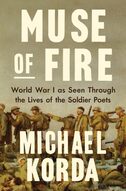
The First World War comes to harrowing life through the intertwined lives of the soldier-poets in Michael Korda’s epic Muse of Fire.
With Muse of Fire, Michael Korda, the best-selling author of Alone and Hero, takes a novel approach to World War I by telling its history through the lives of the soldier-poets whose verses memorialize the war’s unimaginable horrors. He begins with Rupert Brooke and the halcyon days before violence engulfed his generation—destroying the self-contented world of Edwardian England—and ends with the tragic death of Wilfred Owen, killed only days before the armistice brought an end to a war that took over 25,000,000 lives. In a sweeping narrative that echoes The Guns of August, Korda recounts these four years of a civilization destroying itself and portrays the lives and anguished deaths of the young men who unforgettably illuminated it. As the success of Pat Barker’s Regeneration, the remake of All Quiet on the Western Front and the images of brutal trench warfare in today’s Ukraine demonstrate, contemporary interest in “the war to end war” remains high.
With Muse of Fire, Michael Korda, the best-selling author of Alone and Hero, takes a novel approach to World War I by telling its history through the lives of the soldier-poets whose verses memorialize the war’s unimaginable horrors. He begins with Rupert Brooke and the halcyon days before violence engulfed his generation—destroying the self-contented world of Edwardian England—and ends with the tragic death of Wilfred Owen, killed only days before the armistice brought an end to a war that took over 25,000,000 lives. In a sweeping narrative that echoes The Guns of August, Korda recounts these four years of a civilization destroying itself and portrays the lives and anguished deaths of the young men who unforgettably illuminated it. As the success of Pat Barker’s Regeneration, the remake of All Quiet on the Western Front and the images of brutal trench warfare in today’s Ukraine demonstrate, contemporary interest in “the war to end war” remains high.
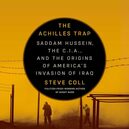
From bestselling and Pulitzer Prize-winning author Steve Coll, the definitive story of the decades-long relationship between the United States and Saddam Hussein, and a deeply researched and news-breaking investigation into how human error, cultural miscommunication, and hubris led to one of the costliest geopolitical conflicts of our time
The Achilles Trap masterfully untangles the people, ploys of power, and geopolitics that led to America’s disastrous war with Iraq and, for the first time, details America’s fundamental miscalculations during its decades-long relationship with Saddam Hussein. Beginning with Saddam’s rise to power in 1979 and the birth of Iraq’s secret nuclear weapons program, Steve Coll traces Saddam’s motives by way of his inner circle. He brings to life the diplomats, scientists, family members, and generals who had no choice but to defer to their leader—a leader directly responsible for the deaths of hundreds of thousands of Iraqis, as well as the torture or imprisonment of hundreds of thousands more.
Calling on unpublished and underreported sources, interviews with surviving participants, and Saddam’s own transcripts and audio files, Coll pulls together an incredibly comprehensive portrait of a man who was convinced the world was out to get him and acted accordingly. A work of great historical significance, The Achilles Trap is the definitive account of how corruptions of power, lies of diplomacy, and vanity—on both sides—led to avoidable errors of statecraft, ones that would enact immeasurable human suffering and forever change the political landscape as we know it.
The Achilles Trap masterfully untangles the people, ploys of power, and geopolitics that led to America’s disastrous war with Iraq and, for the first time, details America’s fundamental miscalculations during its decades-long relationship with Saddam Hussein. Beginning with Saddam’s rise to power in 1979 and the birth of Iraq’s secret nuclear weapons program, Steve Coll traces Saddam’s motives by way of his inner circle. He brings to life the diplomats, scientists, family members, and generals who had no choice but to defer to their leader—a leader directly responsible for the deaths of hundreds of thousands of Iraqis, as well as the torture or imprisonment of hundreds of thousands more.
Calling on unpublished and underreported sources, interviews with surviving participants, and Saddam’s own transcripts and audio files, Coll pulls together an incredibly comprehensive portrait of a man who was convinced the world was out to get him and acted accordingly. A work of great historical significance, The Achilles Trap is the definitive account of how corruptions of power, lies of diplomacy, and vanity—on both sides—led to avoidable errors of statecraft, ones that would enact immeasurable human suffering and forever change the political landscape as we know it.
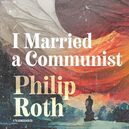
The Pulitzer Prize–winning author of American Pastoral delivers the astonishing story of the rise and fall of an American man whose life is destroyed in the McCarthy witchhunt of the 1950s.
I Married a Communist is the story of Ira Ringold, a big American roughneck who begins life as a teenage ditch-digger in 1930s Newark, becomes a big-time 1940s radio star, and is destroyed, as both a performer and a man, in the McCarthy witchhunt.
In his heyday as a star—and as a zealous, bullying supporter of “progressive” political causes—Ira marries Hollywood’s beloved silent-film star, Eve Frame. Their glamorous honeymoon in her Manhattan townhouse is short-lived, however, and it is the publication of Eve’s scandalous bestselling exposé that identifies him as “an American taking his orders from Moscow."
In this story of cruelty, betrayal, and revenge spilling over into the public arena from their origins in Ira’s turbulent personal life, Philip Roth—who Commonweal calls the “master chronicler of the American twentieth century”—has written a brilliant fictional protrayal of that treacherous postwar epoch when the anti-Communist fever not only infected national politics but traumatized the intimate, innermost lives of friends and families, husbands and wives, parents, and children.
I Married a Communist is the story of Ira Ringold, a big American roughneck who begins life as a teenage ditch-digger in 1930s Newark, becomes a big-time 1940s radio star, and is destroyed, as both a performer and a man, in the McCarthy witchhunt.
In his heyday as a star—and as a zealous, bullying supporter of “progressive” political causes—Ira marries Hollywood’s beloved silent-film star, Eve Frame. Their glamorous honeymoon in her Manhattan townhouse is short-lived, however, and it is the publication of Eve’s scandalous bestselling exposé that identifies him as “an American taking his orders from Moscow."
In this story of cruelty, betrayal, and revenge spilling over into the public arena from their origins in Ira’s turbulent personal life, Philip Roth—who Commonweal calls the “master chronicler of the American twentieth century”—has written a brilliant fictional protrayal of that treacherous postwar epoch when the anti-Communist fever not only infected national politics but traumatized the intimate, innermost lives of friends and families, husbands and wives, parents, and children.
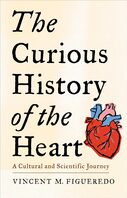
For much of recorded history, people considered the heart to be the most important organ in the body. In cultures around the world, the heart―not the brain―was believed to be the location of intelligence, memory, emotion, and the soul. Over time, views on the purpose of the heart have transformed as people sought to understand the life forces it contains. Modern medicine and science dismissed what was once the king of the organs as a mere blood pump subservient to the brain, yet the heart remains a potent symbol of love and health and an important part of our cultural iconography.
This book traces the evolution of our understanding of the heart from the dawn of civilization to the present. Vincent M. Figueredo―an accomplished cardiologist and expert on the history of the human heart―explores the role and significance of the heart in art, culture, religion, philosophy, and science across time and place. He examines how the heart really works, its many meanings in our emotional and daily lives, and what cutting-edge science is teaching us about this remarkable organ. Figueredo considers the science of heart disease, recent advancements in heart therapies, and what the future may hold. He highlights the emerging field of neurocardiology, which has found evidence of a “heart-brain connection” in mental and physical health, suggesting that ancient views hold more truth than moderns suspect.
This book traces the evolution of our understanding of the heart from the dawn of civilization to the present. Vincent M. Figueredo―an accomplished cardiologist and expert on the history of the human heart―explores the role and significance of the heart in art, culture, religion, philosophy, and science across time and place. He examines how the heart really works, its many meanings in our emotional and daily lives, and what cutting-edge science is teaching us about this remarkable organ. Figueredo considers the science of heart disease, recent advancements in heart therapies, and what the future may hold. He highlights the emerging field of neurocardiology, which has found evidence of a “heart-brain connection” in mental and physical health, suggesting that ancient views hold more truth than moderns suspect.
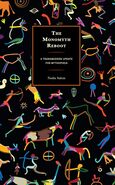
In this book, Nadia Salem examines and questions the enduring relevance of the monomyth, or the hero’s journey, for storytellers and their audiences. Created by Joseph Campbell and largely popularized by George Lucas, the hero’s journey has come to define mythic quests for all. However, in recent years, this genderless paradigm has lost its appeal as a repetitive Bildungsroman, and as a result, Salem argues for the inclusion of the heroine’s journey as a Künstlerroman and a voice of alterity. Where the hero’s journey reflects a coming of age, the heroine’s journey reflects a coming of middle age, which are arguably equally necessary for the complete fulfillment of character. Taking a fresh look at the monomyth, Salem analyzes the narratives of Eros and Psyche, Jane Eyre, and Titanic to argue for an emphasis on the integration of both the hero’s and the heroine’s journeys. Ultimately, this book demonstrates how the monomyth as rebooted turns monomythic mythopoesis into fertile ground for the kinds of epiphanies demanded by transmodernism. Scholars of film studies, communication, composition, and mythology will find this book of particular interest.
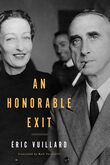
From the award-winning author of The Order of the Day, a piercing account of the lesser-known conflict preceding the Vietnam War that dealt a fatal blow to French colonialism.
How can a modern army lose to an army of peasants?
Delving into the last gasps of the First Indochina War (1946–1954), which saw the communist Việt Minh take control of North Vietnam, Éric Vuillard vividly illustrates the attitudes that both enabled French colonialist abuses and ultimately led to their defeat and withdrawal. From the Michelin rubber plantation, where horrific working conditions sparked an epidemic of suicides, to the battlefield, a sense of superiority over the “yellow men” pervaded European and American forces. And, as with so many conflicts throughout history, there were key actors with a motivation deeper than nationalism or political ideology—greed.
An Honorable Exit not only brings to life scenes from the war, but also looks beyond the visceral reality on the ground to the colder calculations of those who seek to benefit from conflict, whether shrewd bankers, who can turn a military win or loss into financial gain, or intelligence operatives like the CIA, who aim to influence governments across the globe.
How can a modern army lose to an army of peasants?
Delving into the last gasps of the First Indochina War (1946–1954), which saw the communist Việt Minh take control of North Vietnam, Éric Vuillard vividly illustrates the attitudes that both enabled French colonialist abuses and ultimately led to their defeat and withdrawal. From the Michelin rubber plantation, where horrific working conditions sparked an epidemic of suicides, to the battlefield, a sense of superiority over the “yellow men” pervaded European and American forces. And, as with so many conflicts throughout history, there were key actors with a motivation deeper than nationalism or political ideology—greed.
An Honorable Exit not only brings to life scenes from the war, but also looks beyond the visceral reality on the ground to the colder calculations of those who seek to benefit from conflict, whether shrewd bankers, who can turn a military win or loss into financial gain, or intelligence operatives like the CIA, who aim to influence governments across the globe.
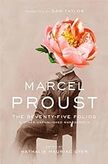
Presented for the first time in English, the recently discovered early manuscripts of the twentieth century’s most towering literary figure offer uncanny glimpses of his emerging genius and the creation of his masterpiece.
One of the most significant literary events of the century, the discovery of manuscript pages containing early drafts of Marcel Proust’s In Search of Lost Time put an end to a decades-long search for the Proustian grail. The Paris publisher Bernard de Fallois claimed to have viewed the folios, but doubts about their existence emerged when none appeared in the Proust manuscripts bequeathed to the Bibliothèque Nationale in 1962. The texts had in fact been hidden among Fallois’s private papers, where they were found upon his death in 2018. The Seventy-Five Folios and Other Unpublished Manuscriptspresents these folios here for the first time in English, along with seventeen other brief unpublished texts. Extensive commentary and notes by the Proust scholar Nathalie Mauriac Dyer offer insightful critical analysis.
Like a painter’s sketches and a composer’s holographs, Proust’s folios tell a story of artistic evolution. A “dream of a book, a book of a dream,” Fallois called them. Here is a literary magnum opus finding its final form.
One of the most significant literary events of the century, the discovery of manuscript pages containing early drafts of Marcel Proust’s In Search of Lost Time put an end to a decades-long search for the Proustian grail. The Paris publisher Bernard de Fallois claimed to have viewed the folios, but doubts about their existence emerged when none appeared in the Proust manuscripts bequeathed to the Bibliothèque Nationale in 1962. The texts had in fact been hidden among Fallois’s private papers, where they were found upon his death in 2018. The Seventy-Five Folios and Other Unpublished Manuscriptspresents these folios here for the first time in English, along with seventeen other brief unpublished texts. Extensive commentary and notes by the Proust scholar Nathalie Mauriac Dyer offer insightful critical analysis.
Like a painter’s sketches and a composer’s holographs, Proust’s folios tell a story of artistic evolution. A “dream of a book, a book of a dream,” Fallois called them. Here is a literary magnum opus finding its final form.
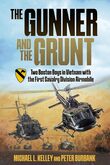
“…a comprehensively researched historic document on one year’s activities for the 9th Cav and the 1st Cavalry Division, worthy of gracing their unit libraries. That the book simultaneously succeeds on the individual soldier level makes it a standout for any reader with an interest in the airmobile aspect of the Vietnam War.”—Vietnam magazine.
The Gunner and the Grunt is written in the voices of two soldiers who fought in the same battles as members of the same recon unit but from different angles. Michael Kelley, the “Gunner,” was flying in an armed helicopter above the jungle providing suppressive fire support, while Peter Burbank, the “Grunt,” was down in the jungle on foot patrol involved in fire fights with Viet Cong and North Vietnamese Army troops.The book follows these two Boston boys from army training through deployment to the war zone and the shock of first combat missions, to helicopter air assault “Search and Destroy” operations from the Cambodian border to the sands of the South China Sea.
The Gunner and the Grunt is written in the voices of two soldiers who fought in the same battles as members of the same recon unit but from different angles. Michael Kelley, the “Gunner,” was flying in an armed helicopter above the jungle providing suppressive fire support, while Peter Burbank, the “Grunt,” was down in the jungle on foot patrol involved in fire fights with Viet Cong and North Vietnamese Army troops.The book follows these two Boston boys from army training through deployment to the war zone and the shock of first combat missions, to helicopter air assault “Search and Destroy” operations from the Cambodian border to the sands of the South China Sea.

An uncompromising study of the fictions, the failures, and the real man behind the myth of Magellan.
With Straits, celebrated historian Felipe Fernández-Armesto subjects the surviving sources to the most meticulous scrutiny ever, providing a timely and engrossing biography of the real Ferdinand Magellan. The truth that Fernández-Armesto uncovers about Magellan’s life, his character, and the events of his ill-fated voyage offers up a stranger, darker, and even more compelling narrative than the fictional version that has been celebrated for half a millennium.
With Straits, celebrated historian Felipe Fernández-Armesto subjects the surviving sources to the most meticulous scrutiny ever, providing a timely and engrossing biography of the real Ferdinand Magellan. The truth that Fernández-Armesto uncovers about Magellan’s life, his character, and the events of his ill-fated voyage offers up a stranger, darker, and even more compelling narrative than the fictional version that has been celebrated for half a millennium.

Richard Bell is an old, bitter man. He once had everything--money, a family, prestige, a place in the community--until he frittered it all away. Now, he knows it is too late to change things. He can barely walk and manages to hurt himself badly while sleeping. With those limitations, how can he fix the lamentable situation he's made of his life?
But this is Middle Falls, where everyone gets a second chance.
The Regretful Life of Richard Bell is the sixteenth book in the Middle Falls Time Travel Series. Like all Middle Falls stories, it can be read as a standalone novel, or as part of the series.
But this is Middle Falls, where everyone gets a second chance.
The Regretful Life of Richard Bell is the sixteenth book in the Middle Falls Time Travel Series. Like all Middle Falls stories, it can be read as a standalone novel, or as part of the series.